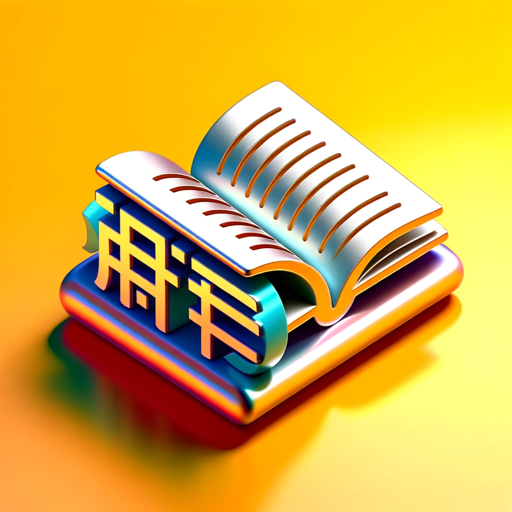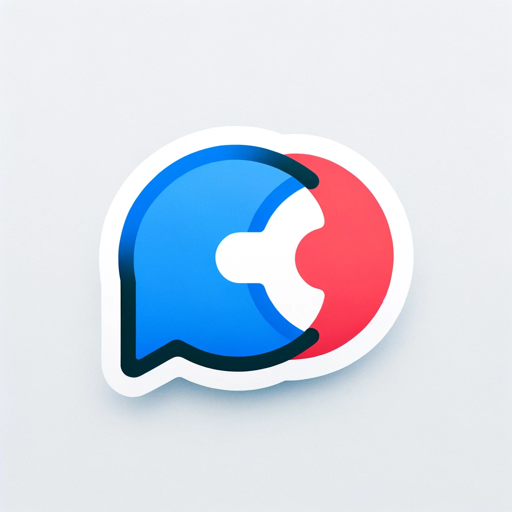这是什么梗-tool to decode trending memes
AI-powered meme decoder and trend tracker
四金一铜是什么意思?
赌狗快摇是什么梗?
我不吃牛肉是什么梗?
佛山电翰是什么意思?
Related Tools
Load More
语桥-专业英文翻译
2024.03.19更新。一个经测验超越专家水平的英译中GPT,通过翻译、编辑、润色三环节给你输出最佳结果。YouTube/B站:AI进化论-花生

English 翻译天团
精准翻译家:让英语老师、中文老师和校长共同帮你翻译英文文章。Credit @dotey

爆款短视频文案脚本
一键生成创造爆款短视频文案脚本。对标中国抖音,小红书,视频号,快手等平台。

爆款口播文案+
根据用户需求完成爆款口播文案设计

微信文章转爆款短视频文案
提供微信文章链接即可快速分析总结文章内容,并帮你改写成爆款短视频文案;当你上传完网址出现三个选择按钮的时候,点击【Always allow】即可开始分析

角色注入提示词
直接输入你的模糊意图(10个字以内)即可,AI会为你生成对应的提示词,例如,你可以输入“学术论文语法校验”,“Java Code Review”等。(公众号:江鸟阁长)
20.0 / 5 (200 votes)
Introduction to 这是什么梗
‘这是什么梗’ is a specialized service designed to explain Chinese internet slang, memes, and trending topics. It serves as a bridge for those who want to understand the deeper meanings and cultural context behind various online terms and popular phrases, which can often be obscure or ambiguous. The design purpose is to provide concise yet thorough explanations that blend humor with insight, helping users stay up-to-date with fast-moving online trends. The tool is particularly valuable for exploring how memes evolve and spread within online communities. For instance, if someone encounters a term like '躺平' (lying flat), which represents a form of passive resistance to societal pressures, they can search for its meaning and get both a simple explanation and a deeper look at the societal context behind the term.

Main Functions of 这是什么梗
Explaining Internet Memes and Slang
Example
When a user encounters the phrase '内卷' (involution), they can query what it means. The explanation would cover not only the literal meaning of the term but also its origins in describing excessive competition and its current usage in Chinese social media.
Scenario
A user sees '内卷' in a viral post discussing workplace competition and uses '这是什么梗' to understand the broader implications of the term.
Tracking Emerging Trends and New Phrases
Example
A new phrase like '精神小伙' (spirit guy) becomes popular, and users want to understand its origins and why it's trending. The service would explain the phrase, detailing its rise from a niche online community to mainstream culture.
Scenario
A user sees the phrase being widely shared on Douyin and wants to understand its meaning before using it themselves or engaging in the conversation.
Providing Cultural Context and Background Information
Example
For the meme '小丑竟是我自己' (the clown is me), the service would explain its humorous tone and self-deprecating usage, while also giving context to how it's commonly applied in situations where someone feels foolish or tricked.
Scenario
A user is puzzled by seeing '小丑竟是我自己' used in a thread discussing failed romantic expectations and uses '这是什么梗' to decode the emotional nuance.
Ideal Users of 这是什么梗
Young Internet Users
These users are highly engaged with social media platforms like WeChat, Weibo, Douyin, and Bilibili. They frequently encounter new slang and memes, which evolve rapidly in these spaces. '这是什么梗' helps them stay current with the latest trends and join conversations seamlessly.
Non-native Chinese Speakers or Expats
For foreigners living in China or those learning Chinese, understanding internet slang can be challenging. This group benefits greatly from '这是什么梗' as it not only provides translations but also the cultural and social context, which might not be apparent through direct translation alone.

How to Use '这是什么梗'
Step 1
Visit aichatonline.org for a free trial without login, no need for ChatGPT Plus. Simply start your experience with no barriers.
Step 2
Familiarize yourself with the interface. Explore available features such as answering trending questions, decoding memes, and discovering the latest internet buzz.
Step 3
Input any trending meme or term you’re curious about in the search bar. You’ll get an instant, concise breakdown of the term’s meaning, origin, and usage.
Step 4
Refine your queries by asking more detailed or contextual questions about the term. You can dive deeper by exploring examples, cultural nuances, or how the term evolves over time.
Step 5
Save or share any explanation that resonates with you. Engage with the community to find out even more interpretations or contribute your own!
Try other advanced and practical GPTs
Margaret Thatcher GPT
Experience Thatcher’s conviction, powered by AI.

ナレコムくん v0.1
Empowering Success through AI Coaching

Expense Compliance Assistant
AI-Powered Expense Regulation Assistant
Product Description Wizard
AI-crafted product descriptions in seconds

Market Maven
AI-powered financial analysis tool

FREE SEO Content Optimizer
Optimize your content with AI-driven SEO analysis.

Everybody Hero!! ✨
Transforming the Ordinary into Heroes.
SLAM Nerd
Empower Your SLAM Projects with AI

Chinese-English translator. 中英翻译.
AI-powered translation for seamless Chinese-English communication

ItalyGPT
Your AI-powered guide to Italy

SFMC Programmatic Languages Expert
AI-powered Salesforce Marketing Cloud Expertise

Branching Scenario Creator 🌳🔀
AI-powered tool for creating custom scenarios

- Social Media
- Viral Content
- Meme Explanation
- Cultural Trends
- Slang Analysis
Common Questions about '这是什么梗'
What does '这是什么梗' help with?
'这是什么梗' decodes trending internet memes, phrases, and slang, giving you a clear understanding of what’s popular online, including its meaning, origin, and context.
Can I ask about any type of meme or term?
Yes, you can ask about any meme, viral phrase, or trending term from social media or internet culture, whether it’s new or old. The system offers insight into a wide range of topics.
How up-to-date is the information?
'这是什么梗' keeps up with the latest trends, so most of the explanations you’ll find are current and reflect ongoing changes in internet culture.
Is '这是什么梗' limited to Chinese internet memes?
Although it specializes in Chinese internet culture, '这是什么梗' can also explain memes and slang from global sources, especially those popular in Asian digital communities.
Can I use '这是什么梗' for research purposes?
Yes, it's a great tool for understanding the cultural significance of internet trends, which can help with academic or marketing research in areas like digital media studies or internet culture.